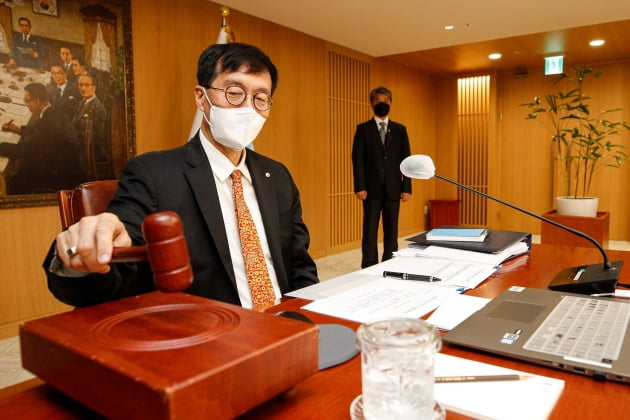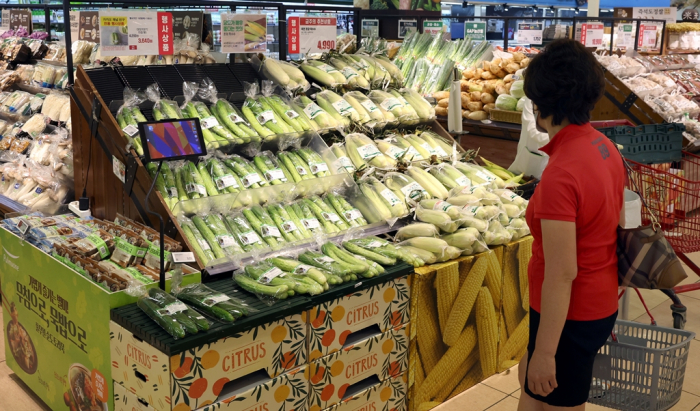Central bank
BOK delivers first-ever 50-bp hike to curb inflation
Bank of Korea Governor Rhee Chang-yong says successive 25-bp hikes look appropriate in the coming months
By Jul 13, 2022 (Gmt+09:00)
3
Min read
Most Read
LG Chem to sell water filter business to Glenwood PE for $692 million


KT&G eyes overseas M&A after rejecting activist fund's offer


Mirae Asset to be named Korea Post’s core real estate fund operator


StockX in merger talks with Naver’s online reseller Kream


Meritz backs half of ex-manager’s $210 mn hedge fund



South Korea’s central bank on Wednesday took the most aggressive measure with a 50-basis-point policy interest rate hike for the first time in its history to curb inflation in Asia’s fourth-largest economy, indicating further tightening at a normal pace on fears of an economic downturn.
The Bank of Korea increased the base interest rate to 2.25% from the previous 1.75% in a unanimous decision. It was also the first time for the monetary authority to ramp up borrowing costs for three consecutive policy meetings.
Local bond market players including traders predicted the BOK to ramp up interest rates, a survey by Korea Financial Investment Association showed earlier this week, with 64% seeing a 50-bp hike.
“Considering inflation and economic conditions, though economic downside risk is indeed high, uncertainties remain elevated, and thus the Board sees it as important at this time to curb the spread of inflation expectations through a 50-basis-point rate hike to prevent acceleration of inflation,” the BOK said in a statement.
Consumer inflation for this year is expected to exceed 4.5% the central bank forecast in May on stubbornly high oil prices and increased demand-side inflationary pressure due to the lifting of social distancing measures, the BOK said.
The country’s consumer prices grew 6% in June from a year earlier, the fastest pace since November 1998 when the country had been hit by the Asian financial crisis.
Other central banks took more aggressive measures than usual to stem inflation. The US Federal Reserve ramped up raised its key rate by 75 bps last month and signaled a similar-sized increase later this month.
FURTHER HIKE AT NORMAL PACE
The BOK indicated further interest rate increases saying, “the Board sees continued rate hikes as warranted, as inflation is expected to run above the target level for a considerable time.”
BOK Governor Rhee Chang-yong said successive 25-bp hikes look appropriate in the coming months should the current inflation trend continue, adding the downside risks to the economy are growing. The BOK usually adjusts its policy interest rate by 25 bps.

The central bank expected economic growth to be lower than its forecast of 2.7% released in May, given risks such as accelerating interest rate hikes in major countries, a prolonged war in Ukraine, and continued lockdown in China.
“It is desirable to go gradually with 0.25-percentage-point hikes rather than a big step if the inflation and growth remain at the current trajectory,” he told reporters, referring to the 50-bp increase in the day.
Rhee said it is reasonable for the financial market to predict the BOK to raise the policy rate to 2.75-3% by the end of this year. The central bank is scheduled to hold three more policy meetings this year – on Aug. 25, Oct. 12 and Nov. 24.
After the remarks, government bond yields fell across the board after the remarks with the highly liquid three-year debt yield down 11.5 bps to 3.176% in the morning, according to the Korea Financial Investment Association.
The BOK is expected to raise the rate by 25 bps next month, said Kim Sungsoo, a fixed-income analyst at Hanwha Investment & Securities.
“It is impossible to stabilize inflation in the short term as most factors are unprecedently high,” Kim said. “It is desirable to tighten as much as possible when the situation is fine as the economy is losing time to endure a tightening bias.”
(Updated with Governor's comments, analyst, market and background)
Write to Mi-Hyun Jo and Eun Bit Ko at mwise@hankyung.com
Jongwoo Cheon edited this article.
More to Read
-
 Central bankBOK likely to take 50-bp big step hike to curb inflation
Central bankBOK likely to take 50-bp big step hike to curb inflationJul 12, 2022 (Gmt+09:00)
1 Min read -

-
 Central bankBOK may take big-step rate hike on Fed's aggressive tightening
Central bankBOK may take big-step rate hike on Fed's aggressive tighteningJun 16, 2022 (Gmt+09:00)
3 Min read -
 Central bankBOK steps up inflation fight with back-to-back rate hikes
Central bankBOK steps up inflation fight with back-to-back rate hikesMay 26, 2022 (Gmt+09:00)
2 Min read
Comment 0
LOG IN


